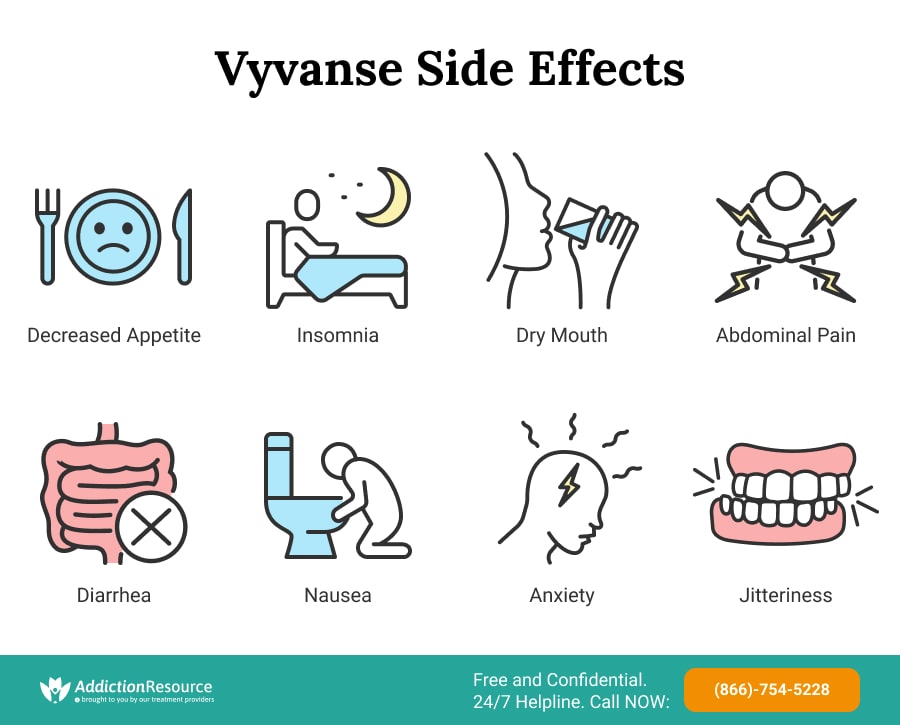Vyvanse, the brand form of Lisdexamfetamine medication, is a medication commonly used for the management of the signs and symptoms associated with Attention-Deficit Hyperactivity Disorder (ADHD) and Binge Eating Disorder (BED). With its longer half-life and high efficacy, Vyvanse effectively reduces hyperactivity and improves attention span in patients with Attention-Deficit Hyperactivity Disorder (ADHD), while in patients with Binge Eating Disorder (BED) it reduces the number of binge days per week.
Table Of Contents:
Despite its high efficacy and desirable effects, the use of this medication comes at a price, as stimulant Vyvanse effects can be observed on almost all body systems. These Vyvanse Side Effects can have a significant impact on and pose several problems to a patient’s overall health.
It is highly important that all patients be aware of all possible Vyvanse Side Effects before starting use. This article will discuss just that, all pertinent information regarding side effects of Vyvanse as well as several points of information relating to adverse phenomena related to the use of this medication such as possible long term effects of Vyvanse use.
Commonly Encountered Vyvanse Side Effects
The medicine is available in different forms and dosages, and the side effects of Vyvanse can all be related to the mechanism of its action causing an overabundance of neurotransmitters such as dopamine, epinephrine, serotonin, and histamine which stimulate both central and peripheral nervous systems. These Vyvanse effects can be more exaggerated if use is combined with other drugs that too have effects modulating the levels of the abovementioned neurotransmitters or with drugs that inhibit the hepatic metabolism of Dextroamphetamine, the active ingredient in Lisdexamfetamine, causing higher circulating levels of the medication available for stimulant effects.
Physical Side Effects Of Lisdexamfetamine
Somatic Vyvanse side effects primarily involve the autonomic nervous system and those body systems that are heavily regulated by the peripheral autonomic nervous system. The most commonly(>2%) reported somatic Vyvanse side effects in both children and adult ADHD and adult BED patients include:
- Decreased Appetite
- Insomnia
- Dry mouth
- Abdominal Pain
- Diarrhea
- Nausea
- Vomiting
- Anorexia
- Anxiety
- Jitteriness
- Hypertension/Elevated Blood Pressure
- Tachycardia/Elevated Heart Rate
- Hyperhidrosis
- Decreased weight
- Tremor
However, It is worth noting that despite these adverse reactions, Lisdexamfetamine is still a highly effective medication for managing the symptoms and signs of Attention-Deficit Hyperactivity Disorder(ADHD) and Binge Eating Disorder (BED). Additionally, patients should not discontinue Lisdexamfetamine or change its dose without first consulting with their doctor. Lastly information about numerous other adverse reactions have been reported in various post-marketing studies, however the rate of their occurrence does not allow the establishment of an adequate connection between their emergence and Lisdexamfetamine use.

Cardiovascular System
Cardiovascular system is especially prone to Vyvanse side effects. Most common of these Vyvanse effects affecting the cardiovascular system include elevated blood pressure and heart rate. Although these two reactions are not particularly dangerous, patients still should have their blood pressure and heart rate monitored while taking this medication.
Alternatively, life threatening reactions such as sudden death, stroke, and myocardial infarction can also occur in both adults and children, especially if they have predisposing structural cardiac abnormalities, cardiomyopathy, serious heart arrhythmia, coronary artery disease, or other serious heart problems.
Lastly, peripheral vasculopathy caused by constriction of blood vessels in the extremities can also be associated with Lisdexamfetamine use. Although the signs and symptoms of this phenomenon are relatively mild and insignificant, in rare cases digital ulcers and soft tissue breakdown may occur, which may force patients to look for alternatives to Vyvanse.
Dermatological Problems And Hair Loss
Hypersensitivity, urticaria, which is also known as hives, and anaphylactic reaction are quite uncommon albeit possible Lisdexamfetamine side effects. In some people, this medication can cause acne and rashes. Also, some patients report finding a connection between use and hair loss, although evidence suggests that this side effect is not usually attributed to stimulant drugs and often occurs due to stress, hormonal problems, and malnutrition.
Gastrointestinal System
The most common reactions affecting the gastrointestinal system as a result of Lisdexamfetamine use include dry mouth, nausea, vomiting, and upper abdominal pain. Patients taking Lisdexamfetamine for Binge Eating Disorder also reported experiencing constipation as well.
Nervous System Problems
Those problems affecting the nervous system associated with Lisdexamfetamine can involve both the central and peripheral nervous systems. These can include symptoms such as insomnia, difficulties with ocular accommodation, blurred vision, dyskinesia, tics, tremor, and seizures.
As a stimulant, Lisdexamfetamine has prominent effects on a person’s psychiatric well being.
Psychological Side Effects Of Vyvanse
Psychiatric adverse reactions can be particularly dangerous, especially in those patients that have predisposing conditions. Most dangerous out of these possible adverse reactions are Exacerbations of pre-existing psychosis; Induction of manic episodes in those patients with bipolar disorder, history of suicide, and depression; and the devvelopment of new psychotic or mannic episodes in children and adolescents without a prior history of psychotic illness or mania. Thus it is highly important to disclose information about any history or risk factors for developing such episodes to your prescribing doctor before initiating treatment. Less worrisome and more common adverse reactions can include irritability, sexual side effects, depression, and anxiety.
Anxiety And Depression
Vyvanse and depression can be connected with each other, especially during withdrawal or poorly managed discontinuation of use. When the stimulant effect of Lisdexamfetamine wears off, the created disbalance in the level of neurotransmitters within the central nervous system can result in symptoms and signs of depression. A person experiencing this phenomenon may feel fatigued, lack motivation, have trouble sleeping and concentrating. It’s important to consult with a doctor before changing dose or discontinuing use to avoid encountering these drawbacks.
Anxiety is another adverse reaction that can be listed among the potential long term effects of Vyvanse use. Vyvanse and anxiety are linked through the same system that facilitates its beneficial impacts on ADHD treatment. Through stimulation of the central nervous system, stimulant drugs essentially put the body under stress, which can sometimes result in panic attacks and even trigger the development of various anxiety disorders.

Sleeping Problems While Using Vyvanse
Insomnia is a common side effect of the majority of stimulant medications, especially in the beginning of treatment. Vyvanse causes insomnia in approximately 27% of patients. Sleep disorders that are inherent to ADHD medications can be particularly disturbing when children are affected, although in many cases they resolve themselves after the initial adjustment period. Vyvanse makes some people tired, sleepy, or even depressed when it’s removed from the person’s system. It usually occurs when the dosage is reduced, when the patient stops taking Lisdexamfetamine altogether, or when its action is diminished in 9 to 14 hours after the ingestion. While such side effects are generally harmless, a person should discuss the problem with their doctor if the condition persists or interferes with their daily activities in a significant way.
Rare Vyvanse Side Effects
Throughout the article uncommon and rare adverse reactions have been mentioned. However, it is quite difficult to establish a side effect as either “rare” or “uncommon” as in medical literature these two terms actually have definitions. An uncommon reaction is defined as one that occurs in approximately 5 people out of 1000 people given a medication. A rare reaction is defined as one that occurs in approximately 5 people out of 10,000 people given a medication. Thus, it is quite difficult to say that a reaction is uncommon or rare without extensive studies that provide information about the exact prevalence of such reactions.
However, the Side Effects That Can Possibly Fall Under These Two Titles Include:
- Sudden cardiac death
- Myocardial infarction
- Psychotic or Manic Symptoms such as hallucinations, delusional thinking, or mania.
- Rare sequelae of peripheral vasculopathy such as digital ulceration and soft tissue breakdown
If a user experiences any of the abovementioned adverse reactions, it is recommended that they contact their prescribing doctor and discontinue Lisdexamfetamine use until they are evaluated by a medical professional.
Taking Vyvanse While Pregnant
Although Lisdexamfetamine is given to children as young as 6 years of age, there are many controversial opinions about Vyvanse and pregnancy. According to the FDA, Vyvanse pregnancy drug category is C. Category C medicines have a somewhat ambiguous status with no clear indication of the level of potential risks. Such drugs have evidence of causing harm in animal studies, but their adverse effects on the fetus have never been examined in controlled human studies. The general guideline for the doctors is to prescribe amphetamines only if the benefits of treatment greatly outweigh the potential risks.
It is generally recommended to stop the use of Vyvanse while breastfeeding. Dextroamphetamine, produced when Lisdexamfetamine is metabolized, is excreted into human milk and can affect a child adversely. At the same time, there is evidence indicating that nursing infants might not be affected by Dextroamphetamine when the mother takes the drug as prescribed. Breastfeeding on Vyvanse is a sensitive issue that has to be resolved individually through evaluating the patient’s needs and physical condition to determine whether the treatment will bring a nursing mother significant benefits.

Vyvanse Weight Loss
Vyvanse is not an approved weight-loss medication, and it shouldn’t be used as one. While it does help counter the effects of binge eating disorders, the use of Vyvanse for weight loss has not yet been studied enough. This is due to the fact that, unlike FDA-approved obesity medicines, Vyvanse was explicitly created to help patients tackle the underlying mental issues that led to the development of binge eating disorders rather than weight gain itself. Losing weight before and after taking Vyvanse requires different levels of effort. Vyvanse weight gain is a serious problem that many people encounter when they stop taking their ADHD medication.
Stimulants make it easier to lose weight by suppressing the appetite and boosting the metabolism, as well as increasing dopamine production, which often helps find motivation to exercise. Once the person stops taking this medication, they might start gaining weight rapidly.
The issue is sometimes so pressing that people go as far as to delay quitting Vyvanse for months and even years. Such behavior patterns contribute to the development of psychological addiction to Vyvanse, as well as possible eating disorders, arising from the person’s fear of gaining excessive weight. This addiction, especially when physical dependence is present as well, can make it virtually impossible for the person to stop using the drug on their own. In this case, addressing a specialized rehab center is the best course of action to find appropriate addiction treatment.
Why Is It Crucial To Seek Professional Treatment?
Vyvanse effects are generally safe and beneficial to patients with ADHD and Binge Eating Disorders. In some cases, minor negative symptoms may appear, such as dry mouth, headache, and sweating. Vyvanse long-term effects mostly refer to psychiatric conditions and might include depression, anxiety, and insomnia. In extreme cases, Lisdexamfetamine might lead to a heart attack, hallucinations, and manias, although these symptoms rarely occur when Lisdexamfetamine is taken according to the prescription. If Lisdexamfetamine overdose is suspected, or the patient displays signs of life-threatening conditions, it is necessary to seek medical help immediately.
Hope Without Commitment
Find the best treatment options. Call our free and confidential helpline
Most private insurances accepted
Page Sources
- Martin D, Le JK. Amphetamine. [Updated 2021 Aug 3]. In: StatPearls [Internet]. Treasure Island (FL): StatPearls Publishing; 2021 Jan-. Available from: https://www.ncbi.nlm.nih.gov/books/NBK556103/
- HARRIS SC, IVY AC, SEARLE LM. THE MECHANISM OF AMPHETAMINE-INDUCED LOSS OF WEIGHT: A Consideration of the Theory of Hunger and Appetite. JAMA. 1947;134(17):1468–1475. doi:10.1001/jama.1947.02880340022005
- Shoptaw, S. J., Kao, U., Heinzerling, K., & Ling, W. (2009). Treatment for amphetamine withdrawal. The Cochrane database of systematic reviews, 2009(2), CD003021. https://doi.org/10.1002/14651858.CD003021.pub2
- Sinha, A., Lewis, O., Kumar, R., Yeruva, S. L., & Curry, B. H. (2016). Adult ADHD Medications and Their Cardiovascular Implications. Case reports in cardiology, 2016, 2343691. https://doi.org/10.1155/2016/2343691
- Stein, M. A., Weiss, M., & Hlavaty, L. (2012). ADHD treatments, sleep, and sleep problems: complex associations. Neurotherapeutics : the journal of the American Society for Experimental NeuroTherapeutics, 9(3), 509–517. https://doi.org/10.1007/s13311-012-0130-0
- Vasan S, Olango GJ. Amphetamine Toxicity. [Updated 2021 Jul 10]. In: StatPearls [Internet]. Treasure Island (FL): StatPearls Publishing; 2021 Jan-. Available from: https://www.ncbi.nlm.nih.gov/books/NBK470276/

 Authored by
Authored by  Reviewed by
Reviewed by 

